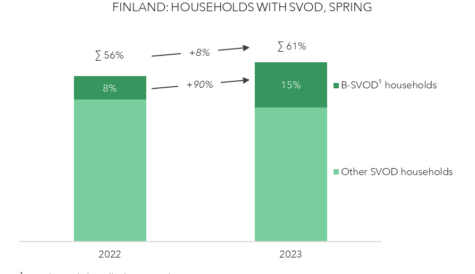
After more than 40 years of operation, DTVE is closing its doors and our website will no longer be updated daily. Thank you for all of your support.
Salto, the ‘French Netflix’, gets green light but with conditions
 Salto, the French video-on-demand JV between the country’s main terrestrial broadcasters, has secured a green light from the country’s competition watchdog but with major conditions attached.
Salto, the French video-on-demand JV between the country’s main terrestrial broadcasters, has secured a green light from the country’s competition watchdog but with major conditions attached.
Salto, which is now scheduled to launch in the first quarter of next year, will include the linear DTT channels and catch-up services along with a SVOD service. The Autorité de la Concurrence said that the project can go ahead but the JV partners must commit to a series of remedies to prevent anticompetitive coordination in the rights acquisition market, the commercialisation of TV channels, the distribution of pay TV services and the advertising market.
The regulator’s approval was welcomed by the three broadcasters behind the project.
“Now that Salto has been approved, we will at last be able to put together Team France in broadcasting, which I have been longing for. The launch of the platform will very soon give us what we need to compete against international players on our own territory. And it will be a new way for the French and European creative industries to engage with their public,” said France Télévisions director-general Delphine Ernotte.
Gilles Pélisson, CEO of the TF1 group said: “I am pleased that this project is becoming a reality, embodying as it does a new ambition for the French broadcasting industry. The Antitrust Authority’s ruling is a very positive sign, as it demonstrates that the authorities awareness for the need to support and accompany industry players in making the necessary innovative changes in order to face new challenges.”
Nicolas de Tavernost, chairman of the executive board of M6 Group said: “This ruling finally gives us the opportunity to work together to develop an offer and a platform that are in phase with changing usage. Our channels are popular with French people, our content is attractive and our technology is very advanced: all reasons to welcome the forthcoming launch of an ambitious joint offer like Salto.
The watchdog expressed concern that France Télévisions, TF1 and M6 could insert clauses in their contracts for the acquisition of linear rights that would make it more complex for competitors to Salto to acquire non-linear rights.
The regulator has thus stipulated restrictions on the ability of the Salto partners to link the purchase of linear and non-linear rights, or for Salto to benefit from contractual clauses in agreements struck by its parent companies.
Regarding linear channels, Salto will not be able to strike exclusive carriage deals for DTT channels in the clear, and the three parent broadcasters will have to make their DTT channels and associated services available, independently of Salto, to all third-party distributors on fair and non-discriminatory terms, with two independent experts commissioned to regulate the price paid by Salto to the broadcasters.
Strict limits will also be placed on the broadcasters to cross-promote Salto on their terrestrial channels.
The Autorité judged that there was little risk of an adverse impact on the distribution of pay TV services given the strength of competitive platforms and the lack of a strong profile of any of the main terrestrial channels in this market, dismissing fears expressed notably by Free boss Xavier Niel in a letter to the regulator in which he complained that Salto would create a “cartel” of the three main broadcasters facing distributors.
Salto’s parent companies will be obliged to sell advertising inventory associated to the SVOD platform only on fair and non-discriminatory terms.
The broadcasters will also be obliged to put in place a set of individual and collective guarantees to limit the exchange of information with Salto only to that which is strictly necessary.
The Autorité de la Concurrence’s approval follows that of media regulator the CSA in July. The media watchdog described Salto as a response to a major shift in consumption of media that “powerful services such as Netflix have accelerated in recent years”. it said that the project would give the broadcasters a better chance to make a return from their investment in programming by providing a supplementary window at a time when the advertising market was under assault from digital players.


